

Five myths of the private prison industry. America has been fighting an ongoing battle against prison overcrowding for decades now, and the preferred method of treatment has been more prisons.
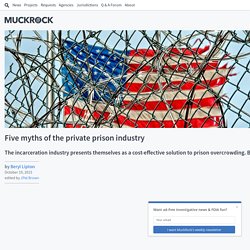
Such a wide reaching problem has always been difficult to tackle, and the symbolic function of punishment repeatedly runs up against its practical elements. Bernie Sanders recently made private prisons a national political issue when he introduced the Justice Is Not For Sale Act into the Senate, but for-profit incarceration, just like America’s inflated prison population, is no new beast. However, it is one with a fine public relations team and a corner of the market seemingly small enough to discount their impact. Or so you’d be led to believe. Let's take a look at the most common myths and misconceptions surrounding the incarceration industry. Playing telephone: inmate complaints highlight issues outside of the FCC's reach. Last month, the Federal Communications Commission announced a second wave of reforms to inmate calling services.
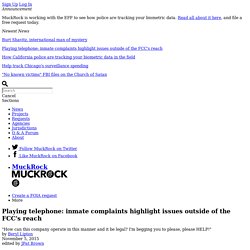
In an effort to relieve exorbitant inmate phone bills incurred by local and in-state contact — a gap unaffected by 2014’s $3.15 cap on 15-minute interstate calls — the newest guidelines place a $1.65 limit on both intra- and interstate phone contact. The regulations are also addressing the assortment of fees companies have attached to most conceivable junctions in the phone account process — deposit fees, auto-payment fees, connection fees, complaint fees.
A recent release of FCC complaints related to inmate calling services captures the confusion and frustration of consumers with often limited resources for the base charges as is. Included are multiple descriptions of mistaken charges, unresponsive companies, and undependable equipment. A New Report Shows How Horrible Life Behind Bars Is for LGBT People. Photo via Flickr user Ken Mayer This article originally appeared on VICE US On Friday, the prison pen pal organization Black & Pink released the results of what is being billing as the largest-ever survey of LGBT people behind bars.
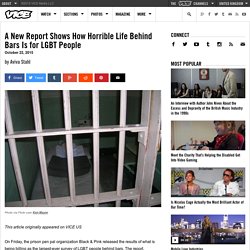
Prisons that withhold menstrual pads humiliate women and violate basic rights. Everyone laughed when Piper Chapman emerged from the shower during the first season of Orange Is the New Black with bootleg shoes made of maxi pads – and inmates do sometimes waste precious resources like sanitary products with off-label uses.

At York Correctional Institution in Niantic, Connecticut, where I spent more than six years, I used the tampons as scouring pads – certainly not as sponges, because prison tampons are essentially waterproof– when I needed to clean a stubborn mess in my cell. That should not lead anyone to think that sanitary products are easy to come by in jail. At York, each cell, which houses two female inmates, receives five pads per week to split. New Plan to Shrink Rikers Island Population: Tackle Court Delays. San Quentin News « The Newspaper of San Quentin Prison. Shadow Prisons. The U.S. government has quietly created a second-class federal prison system specifically for immigrants.
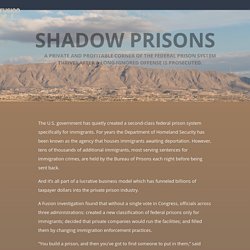
For years the Department of Homeland Security has been known as the agency that houses immigrants awaiting deportation. Prison. Prison bankers cash in on captive customers. For years, JPay has sponsored an award for former state corrections directors presented by the Association of State Correctional Administrators, paying for the recipient’s trip and a Wexford crystal bowl inscribed with the honoree’s name.
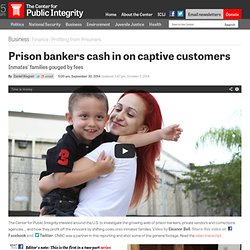
Megabanks have prison financial services market locked up. Lubricating the system Across the country, jails and prisons are hungry for ways to shift their operational costs onto inmates and their families.

Inmates need money to pay for essentials like toiletries and court fines as well as extras like higher-quality food than what is served in prison cafeterias. Their families often pay high fees to send them the money. Inmates, in turn, pay marked-up prices for items sold at prison stores. The oil that lubricates this entire system is supplied by the prison bankers, vendors that collect all the inmates’ money in a pipeline of cash from which payments and fees can be pulled. Providing services inside prisons is a growing business, but it’s not new. Bank of America’s prison contract is an example of how the Treasury Department leans on a power granted during the Civil War to pick and choose its own bankers and allow other agencies to avoid procurement rules that might force a competitive bidding process.
Twenty years later, the U.S. Former Los Angeles Deputy: We Beat, Slapped and Tased Inmates Without Provocation. Share Los Angeles County Sheriff’s deputies inspect a cell block at the Men’s Central Jail in downtown Los Angeles.
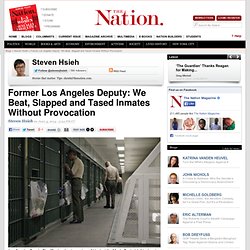
(AP Photo/Reed Saxon, File) An ex-deputy described in federal court Tuesday how he and his colleagues routinely abused inmates at LA County jails and falsified reports to justify their actions, the latest sign of a culture of brutality pervading the county’s jail system. Former Sheriff’s Deputy Gilbert Michel, 40, described how guards would beat, slap and tase inmates unprovoked, knowing that they would receive total impunity for their actions, reports the Los Angeles Times. Inmates use technology to organize state prison protest At least four Georgia prisons were locked down Monday for the fifth-straight day as inmates continue a work-stoppage in protest of conditions.
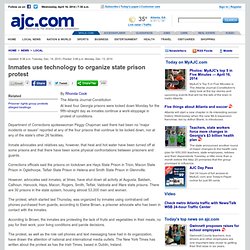
Department of Corrections spokeswoman Peggy Chapman said there had been no “major incidents or issues” reported at any of the four prisons that continue to be locked down, nor at any of the state's other 26 facilities. Inmate advocates and relatives say, however, that heat and hot water have been turned off at some prisons and that there have been some physical confrontations between prisoners and guards. Corrections officials said the prisons on lockdown are Hays State Prison in Trion, Macon State Prison in Oglethorpe, Telfair State Prison in Helena and Smith State Prison in Glennville.
Non-Violent Offenses Leads United States to World's Highest Incarceration Rate. The United States has the highest incarceration rate amongst any country in the world, including China, Iran, Russia or any other socialistic country.
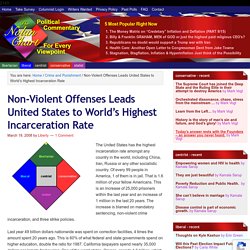
Of every 99 people in America, 1 of them is in jail. That is 1.6 million of your fellow Americans. This is an increase of 25,000 prisoners within the last year and an increase of 1 million in the last 20 years. The increase is blamed on mandatory sentencing, non-violent crime incarceration, and three strike policies. Last year 49 billion dollars nationwide was spent on correction facilities, 4 times the amount spent 20 years ago. Is America really a violent nation? Alcohol and tobacco are drugs with health issues and society issues, like cancer, overdose deaths, and drunk driving. Reason, July 2011: Criminal Injustice (issue on prisons)
Solitary Confinement in the US. The Way to Stop Prison Rape - The New York Review of Books. As three recent studies by the federal Bureau of Justice Statistics (BJS) show, prisoners are raped with terrible frequency in the United States. Prison Rape and the Government by David Kaiser and Lovisa Stannow. Sexual Victimization Reported by Adult Correctional Authorities, 2007–2008 by Allen J. Beck and Paul Guerino National Standards to Prevent, Detect, and Respond to Prison Rape: Notice of Proposed Rulemaking by the United States Department of Justice Initial Regulatory Impact Analysis for Notice of Proposed Rulemaking: Proposed National Standards to Prevent, Detect, and Respond to Prison Rape Under the Prison Rape Elimination Act (PREA) Sexual Victimization in Prisons and Jails Reported by Inmates, 2008–09.
U.S. Prison Conditions. "Perpetual state of crisis" at East Mississippi Correctional Facility (EMCF), a for-profit prison. June 24, 2013 The ACLU, the Southern Poverty Law Center, and the Law Offices of Elizabeth Alexander filed a federal lawsuit in May 2013 on behalf of prisoners at the East Mississippi Correctional Facility (EMCF), describing the for-profit prison as hyper-violent, grotesquely filthy and dangerous. EMCF is operated "in a perpetual state of crisis" where prisoners are at "grave risk of death and loss of limbs. " The facility, located in Meridian, Mississippi, is supposed to provide intensive treatment to the state's prisoners with serious psychiatric disabilities, many of whom are locked down in long-term solitary confinement. The Mississippi Department of Corrections, which ultimately bears responsibility for the unconstitutional conditions at ECMF, has known about these conditions for years but failed to protect the health and safety of prisoners.
An American Gulag—The Mentally Ill at Sup... Secret Experimental Prisons Subject Inmates to Drastic Isolation. March 16, 2011 | Like this article? Join our email list: Stay up to date with the latest headlines via email. The following article first appeared in the Nation. Louisiana Incarcerated - NOLA.com. Louisiana prison system. Federal judge rules consent decree only way to fix 'indelible stain' of Orleans Parish Prison.
Taking aim at years of violence, rapes, suicides and poor conditions at Orleans Parish Prison, U.S. District Court Judge Lance Africk on Thursday approved a federal consent decree mandating sweeping changes at the jail complex to bring it up to constitutional standards. As a follow-up to Thursday's ruling, Africk will preside over a hearing slated for Monday to determine how much the prison reforms will cost and who will pay for them. Dispatch From Detention: A Rare Look Inside Our ‘Humane’ Immigration Jails. Sam Kitching, a soft-spoken, round old man dressed in civilian clothes who works for the Sheriff’s department at the Baker County Jail put his hand on my shoulder and, addressing me as “young man,” said, “It’s very important that you be careful in there.
Torture allegations in North Carolina prison - Charlotte City Buzz. The warden of North Carolina's Central Prison, Warden Gerald J. In Texas, Arguing That Heat Can Be a Death Sentence for Prisoners. Photo. New Mexico driver arrested and forgotten in jail for two years. Five Prison Reform Ideas Being Ignored on Capitol Hill. After last week’s breakthrough in mitigating the damage of the drug war—the U.S. California prisons: Hunger strikes reported at more California prisons - latimes.com. One Year After Historic Hunger Strike, Isolated California Prisoners Report Little Change.
Pelican Bay Prison: One Year Later, Policy Remains "Debrief or Die" Robert Luca, an inmate at Pelican Bay State Prison who was a gang member, looking out the grates of his cell, near Crescent City, California, February 10, 2012. In October 1990, only months after being transferred to Pelican Bay's Security Housing Unit (SHU), Todd Ashker was shot in the right wrist by a prison guard. "This nearly severed my hand from my wrist and caused severe damage to hand, wrist and forearm," he recounted.
Indefinite solitary confinement persists in California prisons - latimes.com. We dare to win: The reality and impact of SHU torture units. Jerry Brown Should (Still) Be Ashamed of Califo... Corrections: The Prison Industrial Complex. Private Prison Companies Want You Locked Up — Justice Policy Institute. 30 Years Later, the Private Prisons Have a Future to Secure. 21st-Century Slaves: How Corporations Exploit Prison Labor. "Voluntary" Work Program Run in Private Detention Centers Pays Detained Immigrants $1 a Day. By the Numbers: The U.S.’s Growing For-Profit Detention Industry. Prison Economics Help Drive Ariz. Immigration Law. The 10 Worst Prisons in America: ADX. Private Prison Company Used in Drug Raids at Public High School.
The Shocking Details of a Mississippi School-to-Prison Pipeline. The intelligence factory: How America makes its enemies disappear—By Petra Bartosiewicz. Pakistan neuroscientist given 86 years for shooting at US agents. White House Drafts Executive Order for Indefinite Detention.